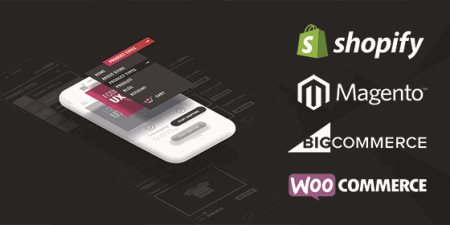A Review and Comparison of Four Top eCommerce Platforms
With Black Friday upon us and the upcoming Holiday season, eCommerce will be booming with traffic, orders and shipments. As highlighted in our last post, online retail truly is the new mainstream commerce model. Not only have they provided traditional brick and mortar stores with a new way to reach a larger audience and bring in more revenue, but eCommerce stores have become a very popular  alternative for new businesses or even entrepreneurs at creating a viable business model and reaching a large, or potentially very niche, market.
alternative for new businesses or even entrepreneurs at creating a viable business model and reaching a large, or potentially very niche, market.
You may have your business name chosen, know your products, have chosen a delivery model & pricing and your launch planned, but do you have the best eCommerce platform for your customers and your business?
Just like the boom of many CMS platforms, there are quite a few different eCommerce platforms available for you. Some that are strictly just eCommerce while others that are add-ons to other CMS platforms to expand it to meet specific business needs. Shopify made its way onto the online retailing scene in 2006 and was all created to start an online store to sell snowboard equipment. Today, they aim not to be just an eCommerce system but strives to be the best eCommerce platform that provides the user everything you need to sell online, on social media, or in person.
Magento, claiming to be the World’s #1 eCommerce platform, prides itself on its open cloud commerce system that provides undeniable flexibility, through its online community and support of over 315,000 developers and 1,150+ highly-trained technology and solution partners. BigCommerce - known considerably more throughout the developer community – promotes itself as a standout due to their integrations and ease of selling on other popular retailing sites such as Amazon, eBay and Facebook, but more so how they cost lower than their competitors. Finally, WooCommerce - considerably the most widely recognized platform – claims to be the leader in eCommerce, with the most customization, vast additional features and ease in how you can expand your business into online retailing.
But which one – out of the ones we compare here – will best suit your needs?
Tips to Help Choose the Right eCommerce Platform
There is quite a bit that goes into building a successful e-commerce business. Some talk about it in a way that you may think that it’s a turn-key, fully automated business model. In fact, online retailing can be just as challenging as any other type of business. And more so, even more challenging than a retail company simply due to how it is reliant upon one single variable: a third-party eCommerce platform. Before diving in to the comparison between platforms, let’s explore some tips on how to choose the right eCommerce platform:
-
Review and fully calculate the costs. For all of them - All these platforms have some sort of pricing model -free but include pricey add-ons, monthly subscription based, or a one-time fee. Just like popular video games, be aware of “in-app” or other additional pricing features you will incur when you scale up, need new features, more bandwidth or need additional admin users to manage the store.
-
Do your Research - Just because your colleague or friend uses this platform and loves it, means it will work for you. Really do your research, read up on comparison articles, client reviews, case studies, complete multiple demos and reach out to others who use the systems to discuss the platform.
-
Make sure your team can use it - Just because you may know how to use it, make sure your current or future team can as well. Look for one with an easy to use interface someone who simply supports customer, to mid-level product specialists and developers can use.
- Select the right hosting - eCommerce platforms and hosting go hand in hand. One can affect the other and you don’t want to be able to have a great site and then have poor hosting.
Shopify
Shopify is a CMS sharpened for online store creation for beginners who are ready to get their feet wet in eCommerce. The platform is easily manageable by non-programmers, with an extremely easy set-up, provides free hosting, is super-fast and secure. Although mainly geared towards beginners, Shopify also enables advanced tools to customize and build the store intentionally generated for advanced developers.
Top Facts:
-
Comprehensive eCommerce tools with 1,400+ apps available.
-
24/7 support via phone, online live chat, email
-
Integrations with social media sites, WordPress blogs
-
Super easy setup, including purchasing a custom domain name
Magento
Magento was released to the market in March of 2008 and was bought by eBay in 2011. Magento is available in two different forms: Magento Open Source - a free CMS software for self-hosted online stores, and Magento Commerce - which includes Open Source and Platform as a Service (PaaS) hosting. Its strength lies in its variety of built-in functions, including changing currency and languages, applying and customizing discounts for products and customers, coupons, reporting, and much more.
Top Facts:
-
Stores: 250,000+
-
Used by: Olympus, 20th Century Fox, Time Out
-
Extensive user and developer community
-
Vast ready-made extensions available on Magento Connect
-
Built for scalability and stores with 10,000+ products
BigCommerce
BigСommerce is one of the newer players in the eCommerce market but is attracting notoriety and investment. BigСommerce is more than your traditional eCommerce platform which includes all the functionality needed for an online store, including hosting, domain, SEO tools, analytics and reporting tools - but it is also a CMS system. Considered as the best option for those with little technical knowledge and feel difficulty in coding due to its comprehensive list of built in features, the key to BigСommerce is its huge knowledge base and training videos available.
Top Facts:
-
Stores: 118,000 +
-
Used by: Toyota, Martha Stewart, Original Moxie
-
Extensive user and developer community
-
High SEO performance
- Hosting and domain are included in the cost
WooCommerce
WooCommerce is not a fully-fledged platform but an eCommerce plugin to be used with the WordPress CMS. However, this doesn’t make it any less powerful as it currently manages 42% of all eCommerce websites on the market today. WooCommerce is an open source solution, the core being free, but incurs costs when it comes to buying customized themes or commercial extensions. Built-in features include selling physical, digital, and affiliate products, geolocation support, Ajax shopping cart, discounts, shipping and tax calculator, SEO optimization and Google Analytics integration.
Top Facts:
-
Stores: 1.5 million +
-
Used by: Beyonce, Etsy, Home Depot, Van Heusen
-
Advanced one-page checkout
-
Over 1500 themes and over 4000 plugins
- Widely used with access to a huge support community
A Review & Comparison
| |
Shopify |
Magento |
BigCommerce |
WooCommerce |
| Features |
- Subscription-based service
- Product management
- Subdomain and hosting space included or use your own
- Order management
- Multiple payment gateways
- Basic customer management
- 100+ professional themes
- Mobile-friendly + CSS editable
- Unlimited bandwidth
- Good reporting on sales and activity
- Discounts, gift cards, and coupon codes
|
- Standalone software + subscription-based service.
- Product management
- Order management
- Multiple payment gateways
- Customer management through customer groups and other
- Some themes available
- Mobile-optimized structure
- Bandwidth depends on the host
- Advanced, in-depth reporting on sales and activity.
- Discounts and coupon codes
|
- Subscription-based service.
- Product management
- Subdomain and hosting space included or use your own
- Order management
- Multiple payment gateways
- Basic customer management
- 80+ professional themes
- Mobile-friendly
- Unlimited bandwidth
- Strong analytics module, with reporting, purchase funnels, abandoned carts stats, and more
- Discounts and coupon codes
|
- Standalone software
- Product management
- Hosted on existing Wordpress website
- Order management
- Multiple payment gateways
- Customer management via third-party plugin
- Thousands of themes available
- Mobile-friendly + CSS editable
- Bandwidth depends on the host
- Good reporting on sales and activity
- Discounts and coupon codes
|
| Pricing |
- $9 / month
- $29 / month
- $79 / month
- $299 / month
|
- $0 for the community edition of the software itself
- ~$100 / year for hosting
- up to $15,000 or even $50,000 / year for the enterprise edition
|
- $29.95 / month
- $79.95 / month
- $249.95 / month
- enterprise-level solutions, up to $900+ / month
|
- $0 for the software itself
- ~$100 / year for hosting
|
| Transaction Fees |
5% to 2% (waived if using Shopify Payments) |
None |
None |
None |
| Payment Processing |
More than 70 external payment gateways |
Many options available |
- PayPal
- Stripe
- Authorize.net
|
- PayPal (Default)
- Stripe
- PayFast
- Amazon Payments
|
| In-person POS sales |
Included |
Via Square |
Included |
Many options |
| Customer Rating |
9.5 |
7.9 |
9.2 |
9.5 |
|

Lynette Sawyer
Lynette Sawyer is a Web Project Manager for Falcon-Software, a digital web agency founded in 1994. For the last 13-years Lynette has been in various digital capacities and her expertise goes beyond Project Management. Lynette brings experience and knowledge in graphic design, marketing communications, project management, product management and engagement.